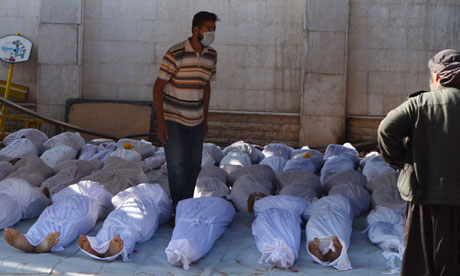 සාරින් විෂවායුව රැගත් රොකට් 2500 ක් ඉරාකයෙන් පැහැර ගැනීමට අයිසිස් ත්රස්තයන් ක්රියා කර ඇතැයි ඇමරිකානු නිලධාරීහු එක්සත් ජාතීන්ගේ සංවිධානයට දන්වා ඇත.
සාරින් විෂවායුව රැගත් රොකට් 2500 ක් ඉරාකයෙන් පැහැර ගැනීමට අයිසිස් ත්රස්තයන් ක්රියා කර ඇතැයි ඇමරිකානු නිලධාරීහු එක්සත් ජාතීන්ගේ සංවිධානයට දන්වා ඇත.මේ හැර ඇමරිකාවට විනාශ කිරීමට නොහැකි වූ රසායනික අවිද පැහැරගෙන තිබේ.
මෙම සාරින් විෂවායු තිබූ කම්හල අයිසිස් ත්රස්තයන් විසින් අල්ලාගෙන ඇතැයි ඉරාක රජය ඇමරිකානු බලධාරීන්ට දන්වා තිබිණි.
මෙකී කම්හල මුතානා නමින් හඳුන්වනු ලැබූ අතර එහි තිබූ රොකට් විනාශ කරලීමට ඇමරිකාවට අමතක වී ඇත.
http://www.divaina.com/2014/10/17/forign02.html
Pic Source
පලි.
මෙවැනි රසායනික අපි පහරදීමකින් සිරියාවේ දරුවන් ඇතුලු පිරිසක් අමානුෂික ඝාතනයකට ලක් වූ අතර, ත්රස්තයෝ ඒ පිලිබඳව රජයටත්, රජය ත්රස්තයන්ටත් චෝදනා එල්ල කළහ.
Related Story in Syria
Sarin gas in attack on Syrian civilians probably government's, says UN
The chemical used in Ghouta district near Damascus in August matches government stockpile and gas used in Khan al-Assal in April last year

Martin Chulov in Beirut
theguardian.com, Thursday 6 March 2014 18.24 GMT
Bodies laid out after the attack on the rebel-held Ghouta suburb
Bodies laid out after the attack on Ghouta, east of Damascus. Syria presents a new kind of challenge to chemical weapons insepctors. Photograph: Reuters
The Syrian opposition has seized on a UN finding that sarin used in a devastating chemical strike last August was likely to have come from the regime's supplies of the weapon as proof that loyalist forces carried out the attack.
The claim was made in a report about human rights abuses released by the global body on Tuesday, which condemned a wide array of atrocities committed throughout the three-year war.
Describing the attack on the Ghouta district near Damascus, the report said: "The perpetrators likely had access to the chemical weapons stockpile of the Syrian military, as well as the expertise and equipment necessary to manipulate safely large amount of chemical agents."
The Syrian military has not reported having lost control of any of its 1,200 tonnes of chemicals, which it is in the process of surrrendering as part of a Russian-brokered deal to avoid US-led air strikes.
The strong wording stops short of apportioning blame for the attack. However, the political wing of the Syrian opposition said the finding was "confirmation" of a regime role.
The sarin attack claimed between 350 and 1,400 lives and was a defining moment in the Syrian war, drawing international condemnation and provoking a bitter debate about who was responsible.
It came during rebel attempts to push towards regime-held districts of the capital, which were being rebuffed by intensive shell fire from Syrian units.
US and European officials claim to have intercepted phone calls immediately after the attack from Syrian officers to the defence ministry and from Hezbollah to senior regime officials demanding to know what had happened. Syria has vehemently denied having carried out the strike, insisiting that rebel groups were the perpetrators.
Ever since, the Organisation for the Prohibition of Chemical Weapons (OPCW) has been leading a process of verifying then securing and transporting Syria's chemical weapons stocks, a mixture of sarin, mustard gas and precursor chemicals.
The transfer is less than 40% complete and is running several months behind schedule. However, efforts to move the chemicals to the port of Tartous and onward to sites in Europe have been stepped up over the past fortnight.
It is understood that samples from the surrendered sarin have been matched to samples taken in the days after the strike. Investigators also said that another chemical attack in Khan al-Assal, near Aleppo last April "bore the same unique hallmarks" as the Ghouta attack.
The report also condemned the regime's use of barrel bombs – large rudimentary explosives dropped from helicopters, which have caused death and destruction in several cities, especially Aleppo. It said torture and "starvation to submission" were also commonly used tactics in the war, which has killed more than 130,000 people and led to around nine million being displaced.
The UN blamed the situation on a combination of government forces and non-state actors on both sides, including paramilitaries fighting alongside loyalist forces, and jihadist groups, who have been fighting with opposition militants.
It said more than 250,000 people remain beseiged by the Syrian army. The UN interviewed 563 people between July and January to reach its findings. The global body has funded one of its largest humanitarian drives ever to aid Syrian refugees in Lebanon, Iraq, Jordan and Turkey, but has been unable to broker a political solution to the fighting, which continues to take on a sectarian feel.











1 comments:
ඇතුලත් කළෙමි. ස්තුතියි!
Post a Comment